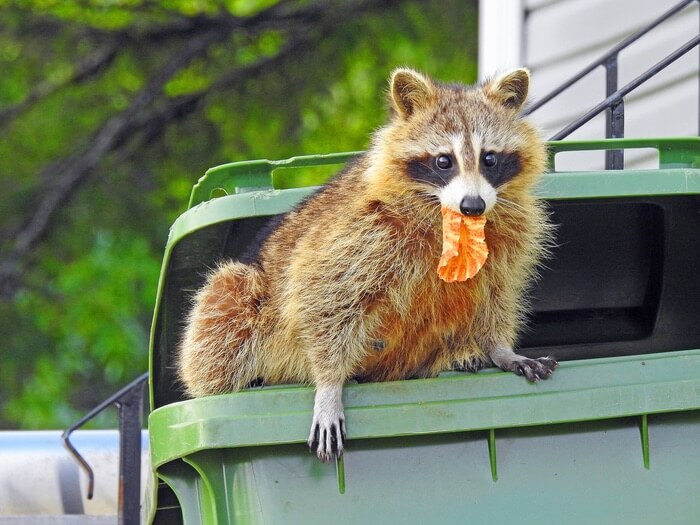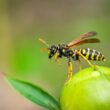There are a number of scents that will keep raccoons away, but some are especially effective. And when it comes to deterring raccoons, you’ll need all the help you can get!
This guide will cover the various scents you can use to repel and keep raccoons away from your property. Some of them might surprise you!
Table of contents
Why You Need To Keep Raccoons Away
Raccoons are one of the most tenacious pests you’ll encounter on your property. These masked mammals are surprisingly intelligent and have nimble hands that help them get into all kinds of trouble. While you rarely see them during the day, raccoons come out of the shadows at night to terrorize entire neighborhoods!
Like any other pest animal, raccoons are mostly concerned with food, shelter, and water. They’ve grown accustomed to living in the suburbs and close to human-made buildings. One of the reasons they flock to heavily populated areas is that homes offer all of the resources they need to survive.
- Words on a wide range of pests including raccoons
- Extra concentrated for long-lasting protection
- Easy application and clean up
- Made from natural ingredients
Thanks to their strong sense of smell, raccoons have a knack for rummaging through garbage and finding even the most well-hidden morsels of food! While some view their trash-collecting behavior as nothing more than a nuisance, it’s important to take action and deter these animals as much as possible.

When they find a reliable source of food, raccoons will stick around and continue to wreak havoc on your home. Females build nests in your attic, under your porch, and any other secure place. You can inadvertently increase the raccoon population while also putting your family and pets in danger.
Raccoons might seem cute at first, but they can be vicious when they need to be. These pests can attack pets and any livestock on your property. Not only that, but they can leave behind feces and other potentially dangerous messes.
That’s just one of the reasons why you should try to keep raccoons away. These animals are known carriers of a slew of viral infections. Some of the most dangerous are rabies, canine distemper, and parasitic worms. Those diseases can quickly spread through bites and droppings.
You should never ignore a potential raccoon infection. Despite the prevalence of these mammals, there are a lot of scents raccoons hate and various repellents you can use to keep them off your property.
Raccoon Repellents & Scents They Hate
The best way to keep away raccoons is to drive them away before they even get into your yard! Instead of resorting to bait traps and other physical deterrents, you can get creative and use the raccoons’ most valuable asset against them.
Here are some scents raccoons hate as well as additional repellent you can use to turn your property into a no-go zone.
1. Black Or Cayenne Pepper
When they’re on the hunt for food, raccoons will utilize their olfactory receptors to pick up even faint smells. It’s how they’re able to find food amidst the garbage in your trash can. Their sense of smell is second to none.
One of the most effective methods for keeping raccoons away is to take advantage of smells they hate, and pepper is one of the most potent smells you can use to do just that! Black pepper or powdered cayenne pepper has a powerful kick that causes tons of discomfort and will likely deter raccoons on your property.
If you’ve ever gotten pepper in your nose, you know how uncomfortable it can be. Now imagine how bad that sensation is for an animal with an ultra-powerful sense of smell!
Sprinkle the pepper in places where raccoons are most likely to find food. Focus on the area where you keep your garbage cans or compost piles. If you have a garden, you can benefit from sprinkling some pepper around the perimeter as well.
Apply the pepper regularly, as it can wash away with heavy rain. It won’t take long for the scent to start keeping raccoons away.
2. Ammonia
Here’s a scent that raccoons hate with a passion. In fact, it’s one of the strongest deterrents on the list!
Ammonia is a chemical compound that’s used in everything from household cleaners to agricultural products. In its purest form, ammonia has an intense aroma that’s fully capable of causing respiratory issues.
In fact, most ammonia products have clear warnings about using them in closed spaces without protection. Without proper ventilation, ammonia can cause coughing fits, watery eyes, and lung pain.
Raccoons can detect ammonia long before they get close, and most will flee the moment the gas hits their noses. That makes it a great repellent you can use to either keep these animals away or get rid of existing ones.
There are a couple of ways to use ammonia. The easiest is to simply pour it into a bowl and place it near potential food sources. The smell will waft through the air and create a barrier of defense.
Alternatively, you can soak some old rags or tennis balls in the ammonia. Once they’re fully saturated, place the item where it’s needed most. You can set it onto your porch or bury it in the trash can.
Either way, soaking ensures that the ammonia evaporates slowly, allowing the smell to linger all night long.
Quick Tip: As always, be careful when dealing with ammonia. While this liquid is readily available, it does have its risks. Make sure to keep it out of harm’s reach and exercise caution if you have young kids or pets running around.
3. Peppermint Oil
If you prefer something a bit more pleasant-smelling, you can try peppermint oil.
- Words on a wide range of pests including raccoons
- Extra concentrated for long-lasting protection
- Easy application and clean up
- Made from natural ingredients
Peppermint essential oils are derived from the plant of the same name. The oil is super potent, but it dilutes with a bit of water or carrier oil.
The best thing about using this oil over ammonia is that it’s easy on your nose. While ammonia can burn and create just as many respiratory issues for you as it would the raccoon, peppermint oil is a lot more bearable! In fact, many use it for diffusers around the home or topical medicinal products.
However, it’s still a scent that will keep raccoons away. It’s a powerful, all-natural repellent that also works with many insects.
To use it, add a few drops of the oil to a spray bottle with clean water. The more oil you add, the more potent the solution becomes.
Spray the oil mixture around your property. Like other sprays, the peppermint oil will get weaker as time goes on. That means you’ll need to reapply pretty regularly.
Quick Tip: If you have access to a lot of peppermint oil, you can use it to saturate rags, cotton balls, and other porous items. Doing so may help you utilize the smell for a bit longer than diluted sprays.
4. Eviction Fluid
Eviction fluid is a unique product with hit or miss results. Homeowners have used this solution to deter raccoons for a long time, but these animals don’t always respond to it in the same way.
Female raccoons are the most likely to stay away from it. That’s because it replicates the scent of male raccoons.
The fluid is a simple mixture of urine and male raccoon gland secretions. It’s pretty cheap and easy to get your hands on, so it may be worth giving it a shot. Typically, it’s available in both liquid and paste form.
As a result, you have some flexibility with the application. The best way to use eviction fluid is to apply it where female raccoons may have a nest with nursing young. Areas like the attic or hidden crawl spaces are an excellent place to start.
Eviction fluid works because it reminds the females of the inherent dangers that males present to their babies. Males frequently practice infanticide. Females smell the eviction fluid and think a dangerous male is nearby, so they’ll often move the nest to a safer location.
5. Epsom Salt
Here’s another cheap product that won’t break the bank to use.
Epsom salt is a form of magnesium sulfate that has a long history of medicinal use. However, it also produces a scent that will keep raccoons away!
Interestingly enough, Epsom salt is virtually odorless. Some manufacturers may add essential oils for bath use, but pure salt shouldn’t be offensive to you or your family at all.
Sprinkle the Epsom salt around your property. You can focus your attention on areas where raccoons might go, such as around the trash or under the porch. However, you can also apply it to your garden and lawn!
Quick Tip: It’s also an effective fertilizer that can benefit a wide range of plants. The salt improves green coloration, enhances flower blooming, and even produces more foliage for bushy plants. All the more reason to use Epsom salt to keep raccoons away!
6. Pepper & Onion Spray
Onion and pepper sprays have a similar effect to standard dry pepper. However, the liquid-based solution might have a longer-lasting impact when it comes to deterring raccoons.
To create your spray, boil equal parts onion and cayenne pepper in some water. For the most pungent results, use raw onion and pepper. Dry spices can do the trick if you’re in a pinch, but the raw vegetables have a stronger scent that will keep raccoons away.
Once your solution cools down, you can transfer it to a spray bottle and apply it to the ground outside. The spray will have a strong smell, but the odor will become less potent as time goes by. For continued protection, apply the spray regularly.
7. Garlic
Garlic is a culinary must-have for most people. But to raccoons, its aromatic scent and flavor are far too much to handle!
There are a few ways to use garlic to keep raccoons away.
If you have a green thumb, consider planting some garlic cloves. Garlic sprouts pretty quickly and produces long stocks with blooms called scapes. The scent emanates from the entire plant, so you can plant the garlic strategically for maximum coverage.
Alternatively, you can simply bury the cloves with no intention of sprouting. Some homeowners like to pop some cloves into the bin along with their trash. That way, raccoons aren’t tempted to rummage through it.
Finally, you can create garlic juice. Like the other spray solutions we discussed, garlic juice is easy to apply around potential food sources. It’ll soak into the soil as the scent lingers to deter raccoons.
To make the juice, pop several cloves into a blender or juicer. Garlic presses work as well.
8. Mothballs
Mothballs contain either naphthalene or para-dichlorobenzene. The chemical compounds are solid at first, making it easy to distribute the mothballs to wherever the raccoons are becoming a problem.
However, the chemicals ultimately transform into gas fumes. The fumes can even soak into nearby porous materials, maximizing the spread even further.
Mothballs are toxic to many animals and insects. The mere scent of the stuff acts as a warning sign to raccoons, making it an effective tool for repellent.
Quick Tip: The only issue is that you need to be cautious. You’re free to sprinkle mothballs outside, near the garbage can, or in the garden. But if you have young kids or pets around, you must take some extra measures to avoid accidental consumption.
Simple mothball holders are an option for this, but they do have limits on how many pieces you can use.
9. Urine From Predators
One of the best methods for keeping raccoons away is to make them think that predators are nearby. Many animals leave behind a scent trail to mark their territory and let their presence be known. Even your dog does this every time they go outside to potty.
Remember, raccoons have a superb sense of smell. It doesn’t take much urine at all to send a signal of danger and repel any nearby raccoons.
So, how exactly do you spread a predator’s urine? Believe it or not, you can buy some at many stores! Scent products like this are available at many bix-box hardware stores. You can also get them at retailers that specialize in hunting gear and outdoor items.
Try using the urine of predators that naturally occur in your area. It’s not too difficult to find products with urine that belong to specific animals. For example, you’ll likely see urine sprays with wolf, bobcat, coyote, and even mountain lion urine.
Whatever you choose, the application process is pretty straightforward. Spray the urine in problem areas. As always, frequently reapply to keep those scent-based warnings as strong as ever.
Areas To Use These Scents & Repellents
Now you know what scents will keep raccoons away, but there’s a bit more you need to familiarize yourself with. These scents are only effective if you use them strategically.
Remember, placement is everything.
You must apply the scents in areas where these bandits will regularly visit. Otherwise, they can easily avoid them and still get to their trash treasure.
The most obvious places to put them are in areas close to food sources. If you’re already trying to get rid of raccoons, you probably have a good idea of where they’re going and how they’re eating. Whether it’s your outdoor trash bin they’re after or your vegetable garden, make that your starting point.
Apply the scents to create an invisible barrier. Think of it as a scent-based wall. If there’s a break in the smell, raccoons can squeeze their way through and still wreak havoc on your home.
If you’re worried about raccoons getting into your house, try putting the scent next to all exterior walls. Make a perimeter with the smell and pay special attention to any potential access points.
Many homeowners forget to take the raccoon’s climbing abilities into account. They can easily use nearby utility poles, wires, and even small gaps in the wall to enter. Douse those areas with the aroma they hate to ensure that they never go near them.
Finally, don’t forget to think about nesting spots. Even when using scents to deter or repel raccoons, many females will brave the smell to get to “clear” sites for nesting. They often turn to attics and chimneys, as most homeowners don’t even think to treat those spots.
Take some time to apply the scents there. Even if you’re not actively dealing with a nursing raccoon, having those lingering aromas around will ensure that none move in.
Other Ways To Deter Them
Scent-based raccoon deterrents are pretty effective, but they’re not the only method for keeping raccoons away. If you want some extra peace of mind, go the extra mile and adopt some other deterrent techniques.
Start by keeping your yard clean. Raccoons love to investigate yards with tons of places to hide. They’ll take advantage of trash, yard debris, and anything else they find for coverage.
To limit potential hiding spots, keep your yard as tidy as possible. Trim back overgrown bushes, pick up brush, and avoid letting things get too out of hand.
Next, you can take some measures to prevent raccoons from gaining access to food. Raccoons will continue to show up if they have success finding food.
Invest in pest-proof trash cans. They have locking mechanisms that raccoons struggle to open. Many also have airtight seals to ensure that the smell doesn’t attract them in the first place.
The same measures should apply to compost piles or dog food bowls. Take everything inside and seal up anything that has to stay outside.
If you want to go all out, you can invest in some additional products that serve as a raccoon repellent.
The sky’s the limit here. Some homeowners turn to additional fencing or garbage cages. Others use electrical wiring that delivers a slight shock.
Motion-detecting products are available, too. Motion-detecting lights will turn on instantly, giving the raccoon a good scare! You can also invest in automatic sprinklers, noise-makers, and a ton of other products.
There are many ways to keep raccoons away. Typically, the best course of action is to adopt several techniques while taking advantage of scent-based repellents to make your yard as undesirable as possible.
Closing Thoughts
Knowing what scents will keep raccoons away is valuable knowledge for any homeowner. These critters are persistent, clever, and not easily deterred!
We hope that you put the repellent suggestions to good use and successfully get rid of pesky raccoons that are roaming through your property. If you have any questions about proper implementation, don’t hesitate to send us a message.



